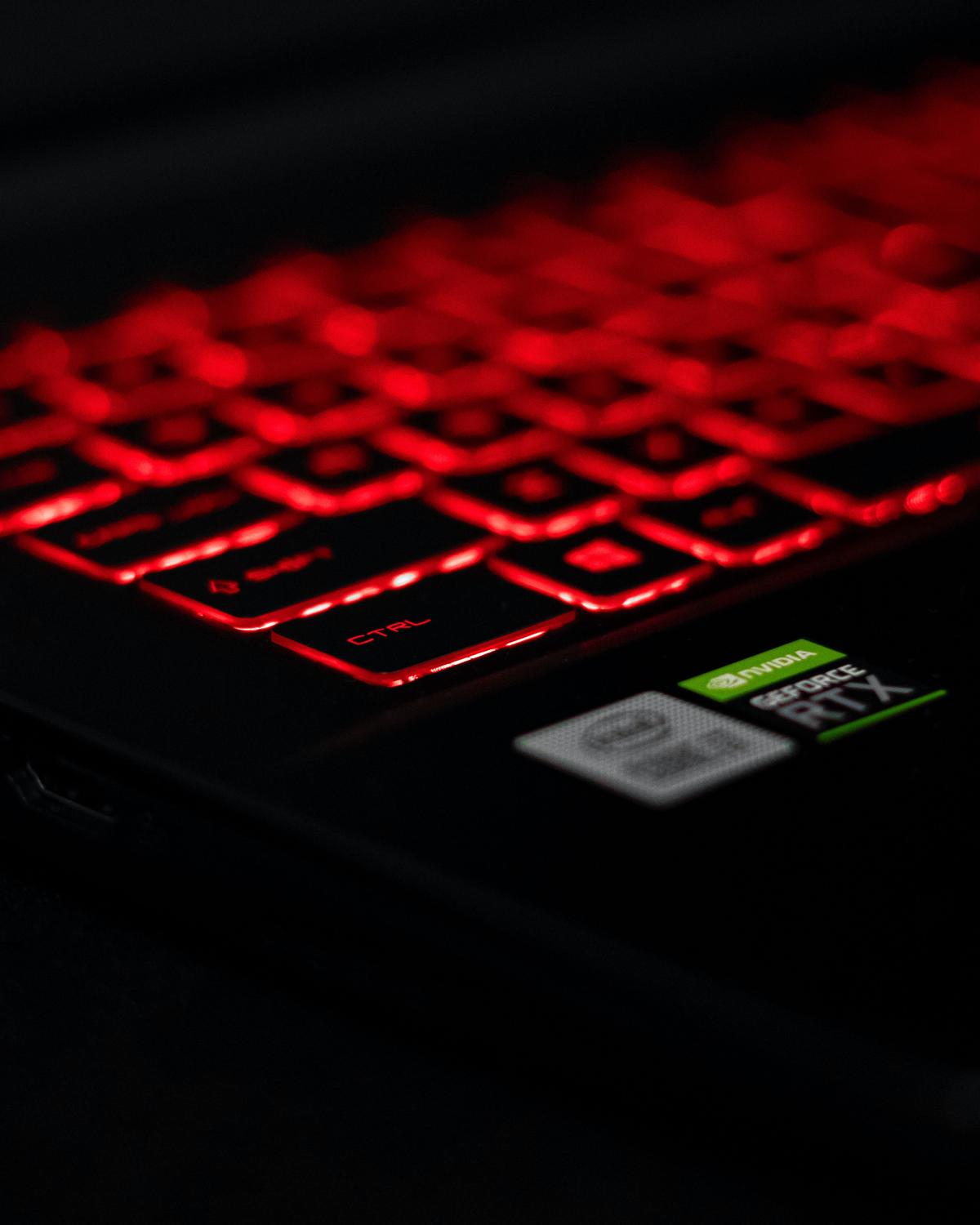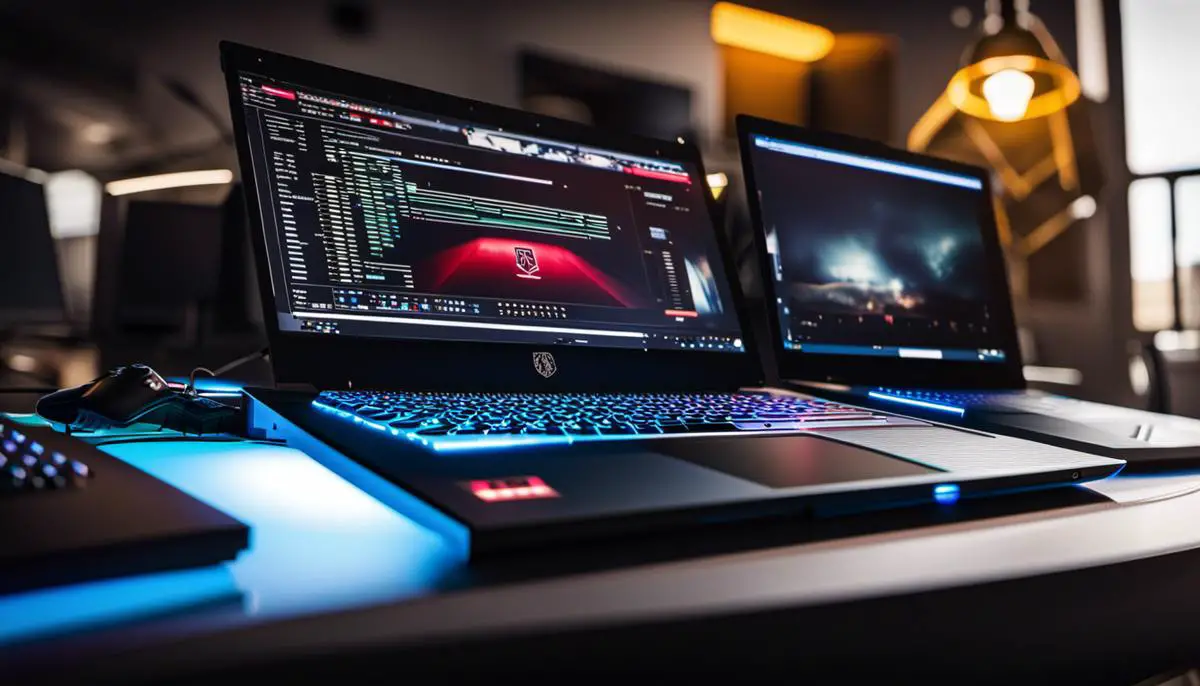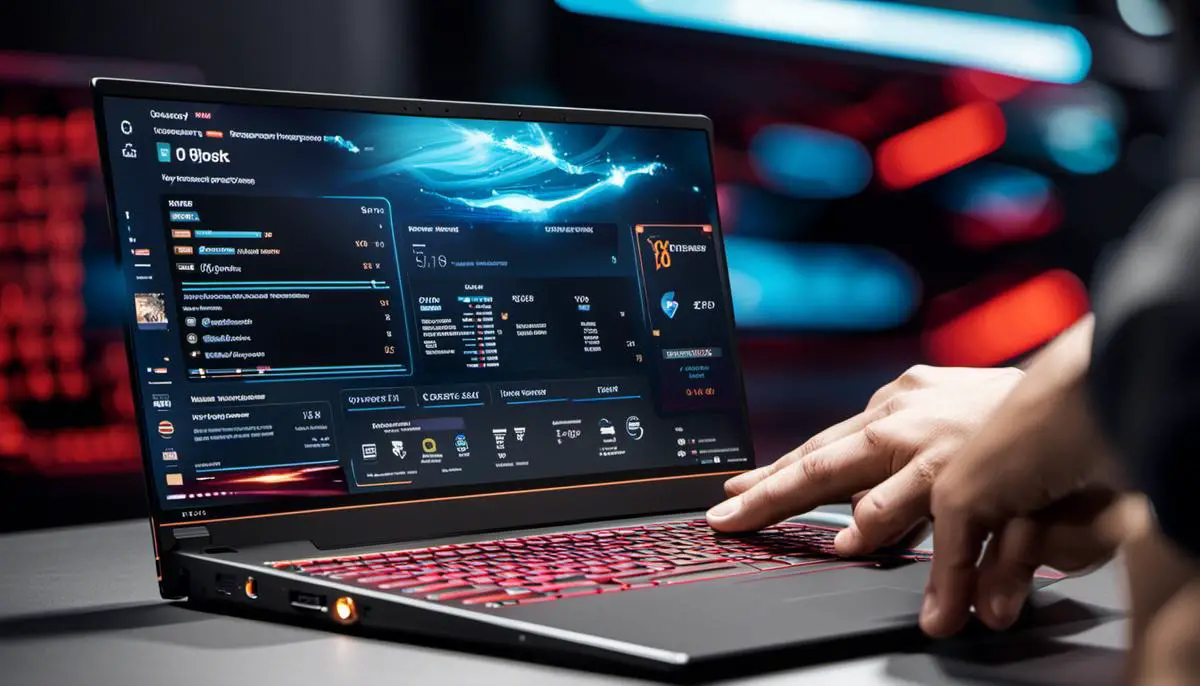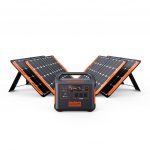Appreciating the art and science of gaming on a laptop doesn’t have to mean breaking the bank. This understanding can help you savor the exhilarating world of gaming on a tight budget.
To begin with, a firm grasp of the clear-cut distinctions between various gaming laptop specifications is pivotal. Processors, memory, storage, graphics, and screen quality each play a distinct role in your gaming experience.
Alongside these configurations, we could sift through an array of good and cheap gaming laptops that offer the best value for money. But before owning one, understanding how to maintain it effectively to prolong its lifespan without compromising performance is similarly crucial.
Table of Contents
Examining Good and Cheap Gaming Laptops Specifications
Examining Gaming Laptop Processors
A budget-friendly gaming laptop’s processor or CPU is deeply intertwined with the system’s overall performance. The better the processor, the smoother games will run. In terms of brands, gaming laptops use processors from Intel or AMD, each with its own advantages.
Intel processors are renowned for higher speed per core, delivering more impressive single-threaded performance, essential for gaming. AMD processors, on the other hand, are popular due to the excellent value they offer, featuring more cores at lower prices. If you are looking for budget-friendly gaming laptops, the Intel Core i5, i7, or AMD Ryzen 5 or 7 series are viable options due to their balance between affordability and performance.
Understanding Memory Requirements
A gaming laptop must have adequate Random Access Memory (RAM) to run games smoothly. The more memory a laptop has, the easier it is for the game to retrieve stored information. For an enjoyable gaming experience, a laptop should have at least 8GB of RAM.
However, if your budget allows, 16GB would provide even better performance. Most quality, affordable gaming laptops on the market include 8GB RAM as standard, with options to upgrade if needed.
Importance of Storage in Gaming Laptops
Storage is another important aspect of a gaming laptop that often gets overlooked. The two types of storage are Hard Disk Drives (HDD) and Solid State Drives (SSD). For gaming, an SSD is preferable due to its faster data transfer speeds, allowing games to load and run quicker. However, SSDs are more expensive per GB compared to HDDs. To keep the cost low without forgoing SSD benefits, a hybrid drive (HDD for storage, SSD for the operating system, and a few games) could be an economical choice.
Graphic Card Requirements in Gaming Laptops
The Graphics Processing Unit (GPU) is arguably the most crucial part for a gaming laptop. This component determines how well games render on your screen. The two main manufacturers of GPUs are Nvidia and AMD.
Nvidia’s GeForce RTX line is currently leading in performance, but it can be pricey. The more affordable GTX line might be more suitable for budget gamers. AMD’s Radeon GPUs provide reasonable gaming performance at lower prices, but they are less common in laptops.
Understanding Screen Quality in Gaming Laptops
When considering a gaming laptop, the screen quality plays a substantial role in determining your overall gaming experience. This can be assessed through factors like screen resolution, refresh rate, and panel type. It’s common for standard laptops to offer a 1080p resolution, usually sufficient for a majority of gamers.
Additionally, a refresh rate higher than 60Hz contributes to a superior gaming experience, with typical mid-range gaming laptops providing up to 144Hz. Furthermore, IPS, TN, and VA are the most seen panel types, wherein IPS typically produces the best color precision and widest viewing angles. Therefore, it’s essential to select a laptop that satisfies both your gaming demands and budget constraints.

Review of Best Cheap Gaming Laptops
Discover the Acer Nitro 5: An Economical Gaming Sensation
For budget-conscious gamers, the Acer Nitro 5 gaming laptop is a remarkable choice, known for its balance between affordability and performance. Its hardware features include an Intel Core i5-9300H processor, an NVIDIA GeForce GTX 1650 graphics card, 8GB DDR4 RAM, and a 256GB NVMe SSD – a surprising addition for its price point.
These specifications open up the potential to experience a plethora of modern games at medium to high settings with ease. The Nitro 5 also boasts a 15.6-inch Full HD IPS display for sharp and vibrant gaming visuals. Though its battery life is fairly standard, offering up to 8 hours on general usage, it’s a minor drawback considering the power it brings to the table, all within a budget-friendly range.
Asus TUF FX505DT: A Solid Package
Next on the list is the Asus TUF FX505DT. This laptop houses a Ryzen 5 quad-core processor and GeForce GTX 1650, which means it can handle most gaming titles with ease. Additionally, the 8GB DDR4 RAM and 256GB NVMe SSD and extensive connectivity options in this price range are noteworthy. A slight negative is the loud fan noise under heavy usage, and users might find the 15.6-inch display on the dim side.
HP Pavilion Gaming: A Balanced Choice
HP Pavilion Gaming laptops manage to strike a good balance in terms of hardware specs and affordability. It operates with an AMD Ryzen 5-4600H processor coupled with a GTX 1650 for its GPU.
It also features a 256GB SSD and 8GB DDR4 RAM, terms that are synonymous with competent gaming laptops. One downside is the plastic build which doesn’t give it a premium feel, but for its price, this laptop has good value for money.
MSI GF63 9SCS-278IN: Value-for-Money Effort
For those who prioritize design and build quality, the MSI GF63 9SCS-278IN is a fantastic choice. Apart from its sleek and sturdy design, it boasts an Intel Core i5-9300H processor, GTX 1650 Max-Q GPU, 8GB RAM, and a 512GB HDD + 256GB SDD storage combo – quite an impressive lineup for a gaming laptop in its price range.
It has reasonably good cooling efficiency, limiting heating issues during heavy gaming. Its 15.6-inch display is compact but somewhat lacks in brightness levels.
Lenovo Legion Y540: Sleek yet Powerful
If you are looking for something more powerful without breaking the bank, consider Lenovo Legion Y540. This gaming laptop is equipped with an Intel Core i5-9300H processor, NVIDIA GeForce GTX 1650 graphics card, 8GB RAM, and 512GB SSD. Its 15.6-inch display with a refresh rate of 144Hz offers a smooth gaming experience.
However, the laptop’s battery life leaves much to be desired, which is a common issue among gaming laptops. On the bright side, it has a sleek design that doesn’t scream ‘gaming’, making it a great choice for those who want a laptop fit for both gaming and work.
Looking for affordable gaming laptops can seem like a daunting task, but all of these options offer value in their own ways. While some may prioritize speed, others might favor screen quality or aesthetics. Ultimately, the best choice depends on what you value the most in a gaming laptop and, of course, your budget.

Maintenance for Long-term Laptop Performance
Maintaining Your Gaming Laptop
One effective way to ensure the longevity and performance of your affordable gaming laptop is through regular cleaning. Over time, dust accumulation in your laptop’s fans and vents can lead to overheating, potentially causing damage to vital components.
Therefore, cleaning your laptop’s cooling system with a can of compressed air is highly recommended. Regularly wiping the keyboard and screen with a soft cloth can also keep your laptop looking in prime condition. Bear in mind that budget gaming laptops might need extra attention due to their less efficient cooling systems.
Up-to-Date Drivers and Software
Updating the drivers and software on your gaming laptop is paramount. Outdated drivers can lead to problems with game performance and compatibility, thus, updating them ensures that your laptop can run new games smoothly. Additionally, software updates often include security patches that protect your laptop from viruses and malware.
Software manufacturers regularly release updates for their products, and most can be installed automatically or with just a few clicks. In cheap gaming laptops, driver and software updates are particularly crucial to squeeze out the best performance possible from the hardware.
Temperature and System Performance Monitoring
Monitoring your gaming laptop’s temperature and system performance is key to maintaining its long-term performance. Overheating can significantly shorten the lifespan of your laptop’s components and may also lead to immediate shutdowns or reduced performance. There are various software tools available that can monitor your system’s temperature and usage information, such as CPUID HWMonitor and MSI Afterburner.
By keeping an eye on these readings, you can better understand your system’s performance and identify issues before they become serious problems. Regularly monitoring your system’s temperatures and managing your usage can help prevent overheating—crucial for gaming laptops that are often subjected to long, intense gaming sessions. This applies to both high-end and cheap gaming laptops.
Performance Tweaking and Optimization
To prolong your gaming laptop’s performance over time, consider optimizing it. This means reviewing the settings on your laptop to ensure it’s running efficiently. For example, you could adjust the power settings to ensure your laptop is not wasting any unnecessary resources when you are not gaming.
You can also optimize your games’ settings to match your laptop’s capabilities—this can help to maintain smooth gameplay even if your machine isn’t top-of-the-line. Cheap gaming laptops may require more in-game setting adjustments to achieve the best balance between performance and visuals.
Hardware Upgrades
While not always a feasible option for all laptops—particularly more budget-friendly models—hardware upgrades can help improve your laptop’s performance and extend its lifespan. Even a simple RAM upgrade can contribute to better multitasking and game performance.
If your laptop allows, a solid-state drive (SSD) can replace a traditional hard drive, offering quicker loading times and an overall snappier experience. Always make sure to research your specific model thoroughly before attempting any hardware upgrades to ensure compatibility and avoid potential damage.
By following these maintenance tips, you can take steps to ensure that your gaming laptop, whether it’s a high-end model or a more affordable option, can deliver excellent performance for many years. Regular cleaning, updates, monitoring, optimization, and potential hardware upgrades can help you get the most out of your investment in a gaming laptop.

Armed with the essential knowledge and understanding of the fundamental considerations when choosing an affordable yet powerful gaming laptop, you’re now ready to make an informed decision.
It doesn’t stop at purchasing, though. Embracing best maintenance practices will undoubtedly enable you to get the most out of your gaming laptop in the long term.
By maintaining consistent updates, ensuring optimal temperatures, and system performance, your laptop’s productivity may exceed your expectations. Embark on your gaming journey, strike the right balance between affordability and performance, and witness your gameplay reach new heights.
FAQ
What qualifies as a “cheap” gaming laptop?
“Cheap” is subjective and varies depending on regions, personal budgets, and market fluctuations. Generally, a cheap gaming laptop would range from $500 to $1000. Within this bracket, you can expect to find entry to mid-level gaming laptops that are designed to handle most modern games at modest settings.
Can I really play games on a cheap gaming laptop?
Yes, you can! The question is more about the level of graphics detail and the frame rates you’ll achieve. A cheap gaming laptop can run many modern games, but you might have to compromise on settings. For instance, while a high-end laptop might run a game smoothly at “Ultra” settings, a budget laptop might require you to drop to “Medium” or even “Low” to maintain playable frame rates.
What should I prioritize in a budget gaming laptop?
GPU (Graphics Processing Unit): This is the heart of a gaming system. Even in a budget range, seek out dedicated graphics cards from NVIDIA or AMD.
CPU (Central Processing Unit): While not as crucial as the GPU for gaming, it’s still important. Ideally, go for a recent generation Intel i5 or AMD Ryzen 5.
RAM: 8GB is the bare minimum for most modern games, but 16GB will ensure smoother multitasking and better performance in RAM-intensive games.
SSD Storage: SSDs provide faster load times than HDDs. Even a smaller SSD (like 256GB) for the OS and primary games, supplemented by a larger HDD, can offer a significant performance boost.
Are there any reputable brands for budget gaming laptops?
Brands such as Acer, ASUS, Lenovo, HP, and Dell are well-established and have ranges dedicated to budget gaming. Each brand will have its strengths, so reading specific model reviews can give insight into their performance, build quality, and customer service.
Will I be able to upgrade a cheap gaming laptop in the future?
Typically, budget gaming laptops allow for RAM and storage upgrades. This means you can add more memory or switch to a larger or faster SSD/HDD down the road. However, most laptops won’t allow you to upgrade the CPU or GPU as they are integrated into the motherboard.
What sacrifices do I make with a budget gaming laptop?
Build Quality: Premium materials like aluminum or magnesium alloys are usually reserved for higher-end models. Budget options might use more plastic.
Display: You might get a lower resolution (like FHD instead of 4K) or lower refresh rates (60Hz instead of 120Hz or 240Hz).
Thermal Performance: Cheaper laptops may not have the best cooling solutions, leading to higher temperatures which can reduce component longevity.
Battery Life: Powerful components consume more energy. Without the premium, energy-efficient designs of high-end laptops, budget options might have shorter battery life, especially during gaming sessions.
Can I use a budget gaming laptop for tasks other than gaming?
Definitely! The powerful CPUs and GPUs in gaming laptops are also great for tasks like video editing, 3D rendering, and graphic design. Additionally, they’re more than sufficient for everyday tasks like browsing, streaming, and office work.






